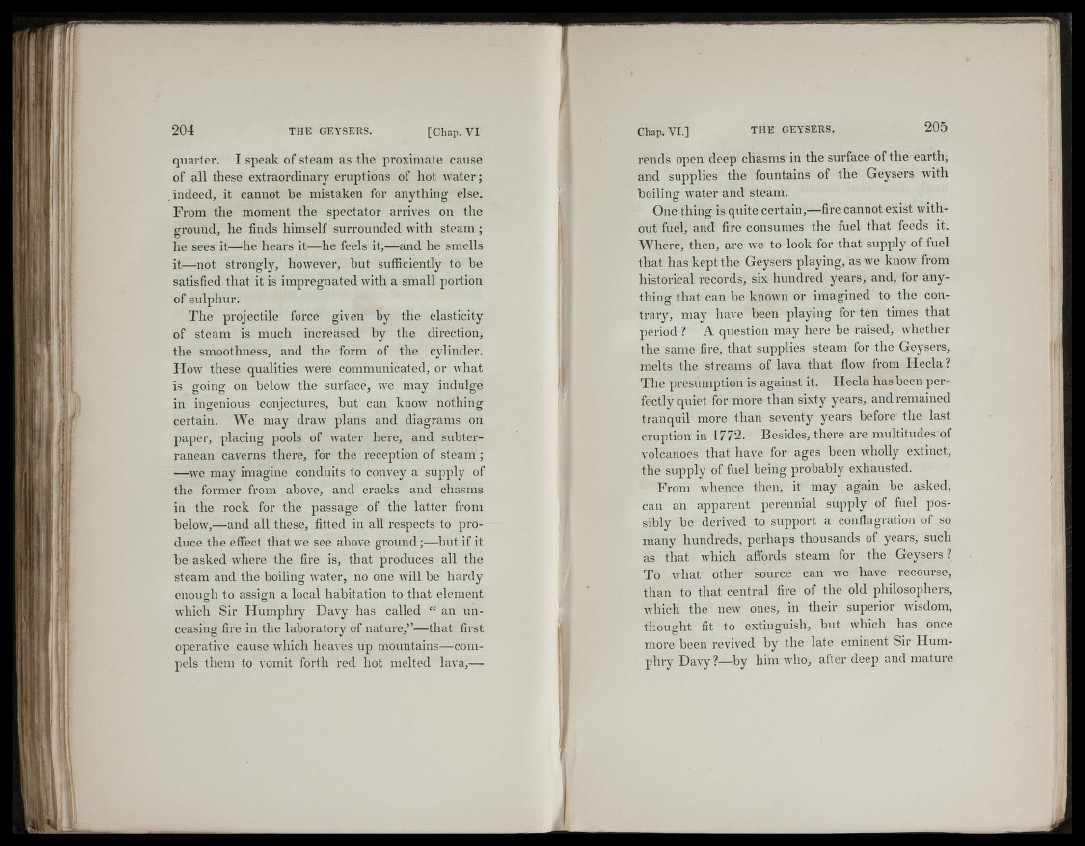
f
lili
quarter. I speak of steam as the proximate cause
of all these extraordinary eruptions of hot Avater;
indeed, it cannot he mistaken for anything else.
From the moment the spectator arrives on the
ground, he finds himself surrounded Avith steam ;
he sees it— he hears it— he feels it,— and he smells
it— not strongly, hoAA'ever, but sufficiently to be
satisfied that it is impregnated Avith a small portion
of sulphur.
The projectile force given by the elasticity
of steam is much increased by the direction,
the smoothness, and the form ^ of the c•y/ linder.
H oav these qualities Avere communicated, or Avhat
is going on beloAv the surface, Ave may indulge
in ingenious conjectures, but can knoAV nothing
certain. We may draAV plans and diagrams on
paper, placing pools of Avater here, and subterranean
caA'erns there, for the reception of ste am ;
— Ave may imagine conduits to convey a supply of
the former from above, and cracks and chasms
in the rock for the passage of the latter from
heloAA',— and all these, fitted in all respects to produce
the effect thatAve see aboA'e ground;—but if it
he asked Avhere the fire is, that produces all the
steam and the boiling Avater, no one Avill be hardy
enouo-h to assign a local habitation to that element 55 55
Avhich Sir Humphry Davy has called “ an unceasing
fire in the laboratory of nature,”—that first
operative cause vvhich heaves up mountains—compels
them to vomit forth red hot melted lava,—
rends open deep chasms in the surface of the earth,
and supplies the fountains of the Geysers with
boiling water and steam.
One thing is quite certain,—fire cannot exi* st w*i t1hout
fuel, and fire consumes the fuel that feeds it.
Where, then, are we to look for that supply of fuel
that has kept the Geysers playing, as we know from
historical records, six hundred years, and, for anything
that can be known or imagined to the contrary,
may have been playing for ten times that
period ? A question may here be raised, whether
the same fire, that supplies steam for the Geysers,
melts the streams of lava th a t flow from Hecla?
The presumption is against it. Hecla has been perfectly
quiet for more than sixty years, and remained
tranquil more than seventy years before the last
eruption in 1772. Besides, there are multitudes of
volcanoes that hav'e for ages been wholly extinct,
the supply of fuel being probably exhausted.
From whence then, it may again be asked,
can an apparent perennial supply of fuel possibly
be derived to support a conflagration of so
many hundreds, perhaps thousands of years, such
as that which affords steam for the Geysers ?
To what other source can we hav'e recourse,
than to that central fire of the old philosophers,
which the new ones, in their superior wisdom,
thought fit to extinguish, but which has once
more been revived by the late eminent Sir Humphry
Davy ?—by him who, after deep and mature